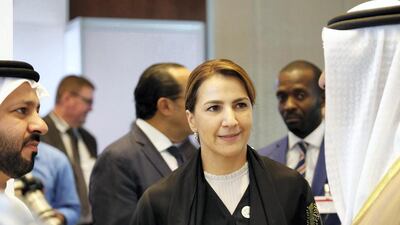Close to six million tonnes of food is now produced in the UAE each year, reflecting a growing shift away from a dependence on imported goods.
The food and beverage industry has become the nation’s third largest in terms of manufacturing, with 5.96 million tonnes of food supplied by 568 factories.
Almost half of that production, 2.3 million tonnes, is considered essential and is placing less reliance on imported goods.
Government ministers sitting on the Emirates Food Security Council said food production could grow even further during times of crisis like the coronavirus pandemic.
“The food and beverage industry is one of the most important manufacturing sectors in the country,” said Suhail Al Mazrouei, Minister of Energy and Industry.
“It is key for achieving food security and self-sufficiency in basic commodities.
“Small and medium-sized national factories account for the overwhelming majority of the sector and provide local and regional markets with a variety of primary and secondary products.
“Many major international brands have set up factories in the UAE, taking it as a regional centre for their manufacturing and supply activities.”
Ministers said the flexibility demonstrated by food factories to keep up with demand during the coronavirus outbreak sent a positive message on the nation’s future food security.
Food and beverage manufacturing currently accounts for 30 per cent of total investments and employs 10 per cent of all workers in the UAE industrial sector.
Yields are set to grow further by using technology-enabled production methods such as vertical farms and hydroponic growing techniques.
That aims to increase production of essential foods by 15 per cent by 2021 under the National Food Security Strategy.
Essential items at the core of production include dairy products, cooking oil, dates, fresh poultry, fish and seafood.
Factories in the UAE also produce sugar, tea, pepper, eggs, baby food, wheat, rice, coffee and fresh meat.
The UAE is currently ranked 31st in the Global Food Security Index, created by The Economist Intelligence Unit. It aims to be among the top 10 countries by 2021.
Of the 568 food and beverage factories operating throughout the UAE, 40 are in Abu Dhabi, 315 in Dubai, 77 in Sharjah, 72 in Ajman, 34 in Umm Al Quwain, 23 in Ras Al Khaimah and seven in Fujairah.
Officials said maximum production can top 16.3 million tonnes a year, if required.
“These production capacity figures reflect the strength of the food processing sector and our ability to triple production if needed,” said Mariam Al Mheiri, Minister of State for Food Security.
“In the coming period we will be striving to enhance the capacities of these factories with various technological capabilities and enable them to diversify the production of products.”
Duringva media briefing last week, Omar Bushahab, head of Dubai Food Security Committee, said the emirate has sufficient essential food stocks to last for more than a year.
He said there is 13 months worth of wheat and stocks of rice to last a further eight months.


